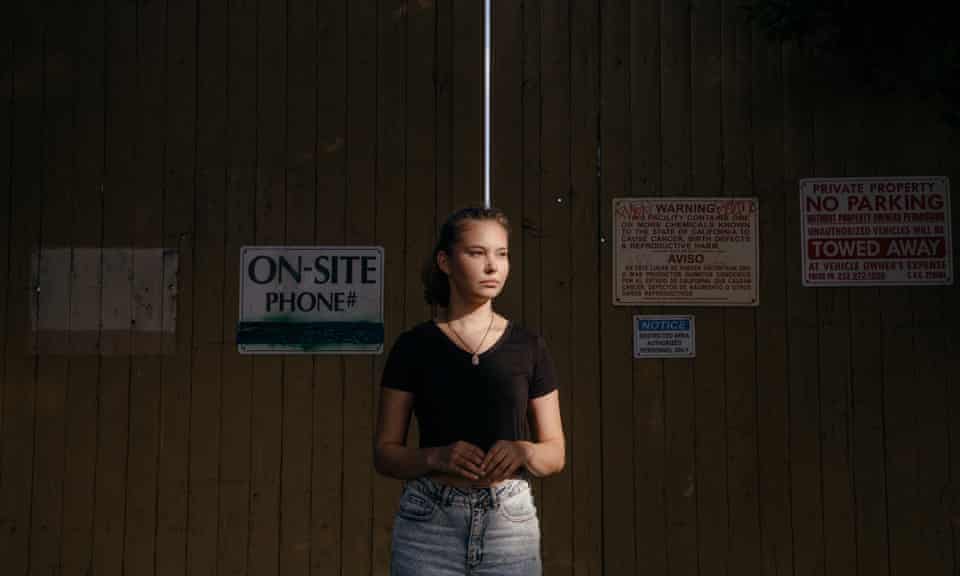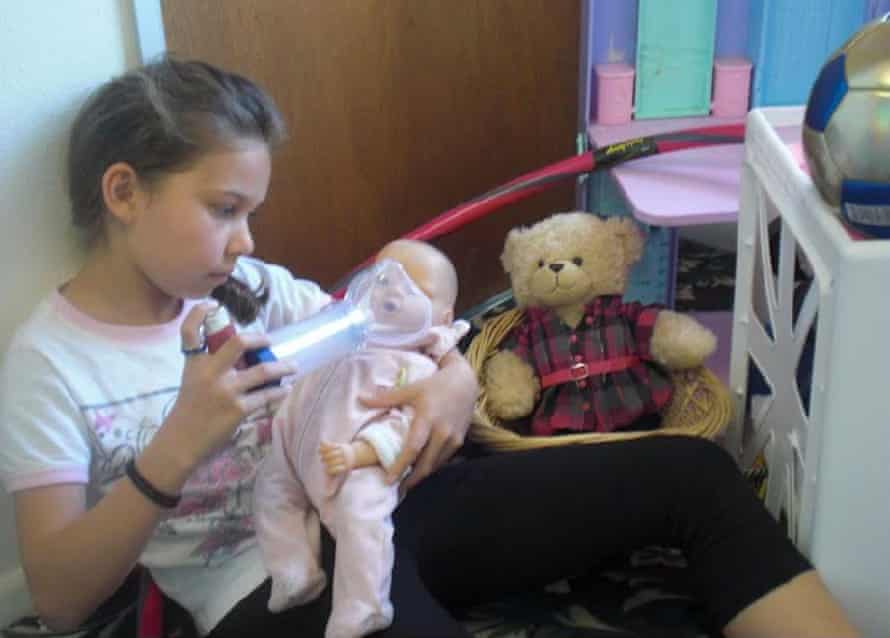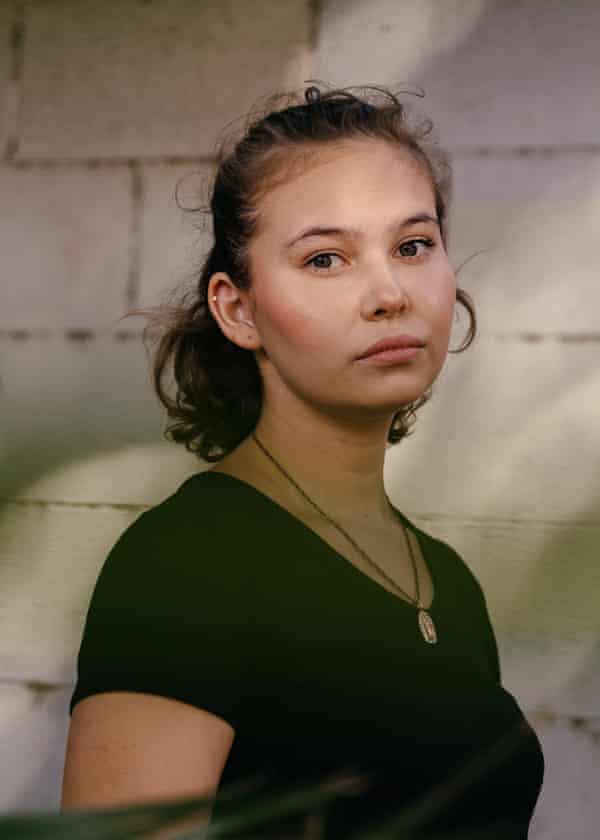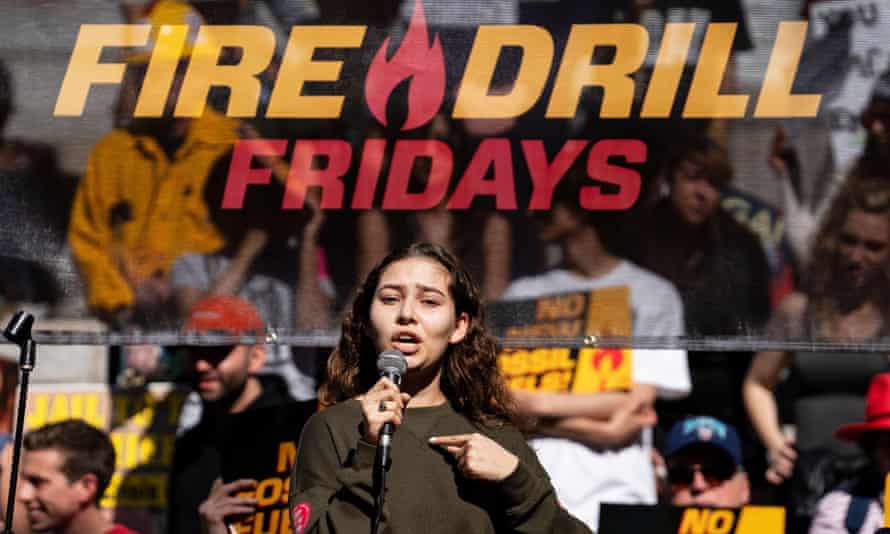
Nalleli Cobo in front of the oilwell near her home that regulators have ordered to be permanently closed and secured. Photograph: Jessica Pons/The Guardian
The outspoken
After forcing the closure of an oilwell that was making her family and community sick, Cobo seemed about to become a household name – but then she fell seriously ill
by Nina Lakhani
Wed 10 Nov 2021
At the age of nine, Nalleli Cobo started getting nosebleeds so severe that she had to sleep sitting up so as not to choke on the blood. Then there were the stomach cramps, nausea, headaches and body spasms, which made walking difficult. For a time she wore a heart monitor as doctors struggled to understand what was wrong.
But it wasn’t just Cobo. The nine-year-old was growing up in University Park, a low-income, majority-Latino neighborhood in Los Angeles, the smoggiest city in the US, which ranks highest in the country for deaths linked to air pollution. She and her three older siblings were raised by her Mexican mother, grandmother and two great-grandparents. (Her father was deported to Colombia when she was three.) And suddenly, almost her entire family was ill – including her mother, who developed asthma at 40, as did her grandmother at 70.
We won, and it was 10 times more awesome because it was the youth demanding our right to a livable futureNalleli Cobo
It was the same story throughout the neighborhood: previously healthy children were suddenly missing school and spending hours at the emergency room, but nobody knew why. Not long afterwards a foul smell engulfed the community. It was like rotten eggs, recalls Cobo, and so nauseating that they had to keep the windows closed at all times. Sometimes it smelled like artificial guava or chocolate, mixed with rotten eggs.
Cobo’s mother works for Esperanza Community Housing, and she enlisted the organisation to help investigate. It turned out the stench was caused by the oilwell located 30ft (9 metres) from the family home. The oil company Allenco had ramped up drilling. (The guava and chocolate odours were the company’s attempt to alleviate the problem.) At Esperanza’s request, the campaigner group Physicians for Social Responsibility sent a group of toxicologists to meet the community and explain the health threats posed by the oilwell.
“That’s when we started connecting the dots between the oilwell, the smell and sick kids,” says Cobo. Now 20, she is speaking to me on a video call from her bedroom in LA, while cuddling her five-month-old fluffy white puppy, Albondiga, which means meatball in Spanish. “It’s when I started learning the ropes of activism.”

Cobo in a family photograph.
Photograph: Courtesy of Nalleli Cobo
Cobo and her mother started knocking on doors and co-founded People Not Pozos (People Not Wells) – a grassroots community group, which filed complaints to regulators, shared stories at town hall meetings and testified at city hall and other government hearings. Cobo was a natural storyteller – honest, passionate and compelling – but recalls how it wasn’t always easy to be heard. “I was often dismissed as a silly little girl, like my story didn’t matter because I didn’t know all the science or all the fancy terms.”
Inspired by her mother’s activism, she refused to give up. “My mom always told me that I had to be an important member of the community. If sharing my story was going to help create change, why would I stay silent?”
Cobo’s youth and persistence captured the attention of local media, lawmakers and A-list celebrities. A barrage of local and federal investigations was launched. When environmental protection officials spent a short time at the site, they too got ill.
Then, on a chilly November evening in 2013, when Cobo was 12 years old, the phone rang. The family was having dinner – Mexican potato soup, she remembers. By the time Cobo’s mother put the phone down, she was crying at the extraordinary news: Allenco was suspending operations at the well.
Cobo was beside herself with joy. “I started screaming: ‘We did it, we did it,’ ran to the window and opened it for some fresh air – something so basic that we hadn’t been able to do for years,” she says.
The change when the drilling stopped was almost instant. “It was like day and night. My nosebleeds stopped, no more headaches or heart palpitations, I didn’t need my inhalers every day. All the kids started to feel better. I’ll never forget that moment,” says Cobo.
The victories kept on coming for Cobo and her community. In September, Los Angeles County supervisors voted unanimously to phase out oil and gas drilling and ban new drill sites in the unincorporated areas of the most populous county in the US. More than 1,600 active and idle oil and gas wells, which are mostly located in communities of colour, could be closed over the next few years.

Cobo and her mother started knocking on doors and co-founded People Not Pozos (People Not Wells) – a grassroots community group, which filed complaints to regulators, shared stories at town hall meetings and testified at city hall and other government hearings. Cobo was a natural storyteller – honest, passionate and compelling – but recalls how it wasn’t always easy to be heard. “I was often dismissed as a silly little girl, like my story didn’t matter because I didn’t know all the science or all the fancy terms.”
Inspired by her mother’s activism, she refused to give up. “My mom always told me that I had to be an important member of the community. If sharing my story was going to help create change, why would I stay silent?”
Cobo’s youth and persistence captured the attention of local media, lawmakers and A-list celebrities. A barrage of local and federal investigations was launched. When environmental protection officials spent a short time at the site, they too got ill.
Then, on a chilly November evening in 2013, when Cobo was 12 years old, the phone rang. The family was having dinner – Mexican potato soup, she remembers. By the time Cobo’s mother put the phone down, she was crying at the extraordinary news: Allenco was suspending operations at the well.
Cobo was beside herself with joy. “I started screaming: ‘We did it, we did it,’ ran to the window and opened it for some fresh air – something so basic that we hadn’t been able to do for years,” she says.
The change when the drilling stopped was almost instant. “It was like day and night. My nosebleeds stopped, no more headaches or heart palpitations, I didn’t need my inhalers every day. All the kids started to feel better. I’ll never forget that moment,” says Cobo.
The victories kept on coming for Cobo and her community. In September, Los Angeles County supervisors voted unanimously to phase out oil and gas drilling and ban new drill sites in the unincorporated areas of the most populous county in the US. More than 1,600 active and idle oil and gas wells, which are mostly located in communities of colour, could be closed over the next few years.

‘I’ve always wanted to be president.’
Photograph: Jessica Pons/The Guardian
But the industry is expected to oppose the unprecedented move and the fight is far from over, says Cobo. “I dream of a world where all urban oil drilling is read about in history books. A world with 100% clean renewable energy, where people can breathe the air outside without getting sick, and open their faucet and drink the water because it’s clean. That’s the world I’m fighting to achieve, a better and safer one for all of us.
“A lot of times when you’re in this fight they make you feel like you’re going to lose, and there are moments when I break down and cry. But I am a person of faith, so I think about David and Goliath, and that’s how this story is going to end. Me and my community, we are David; the oil industry, the broken regulatory system, the billionaires are all Goliath, but their tactics won’t stop my community from fighting.”
A 2020 analysis by the nonprofit FracTracker Alliance found that about 2.2 million people in California live within half a mile of an oil or gas well; another 5 million live within one mile. More than 60% of the 25,000 drilling permits issued by the state between 2015 and 2020 were in majority-Latino communities.
In 2015, the South Central Youth Leadership Coalition, which Cobo co-founded, joined other organisations to sue the city of Los Angeles for rubber-stamping oil projects in communities of colour. As a result, the city adopted new requirements for drilling applications to ensure compliance with state environmental review rules and to protect vulnerable communities. The oil industry countersued and lost.
“We won, and it was 10 times more awesome because it was the youth demanding our right to a livable future,” says Cobo, who has spoken out about environmental racism – the dumping of polluting and hazardous industries such as toxic chemical plants, fossil-fuel sites and highways in places where people of colour and indigenous communities live, work and play.
“It’s heartbreaking and infuriating how these industries and billion-dollar corporations have gotten away with poisoning us. The way the oil industry sees us is as just a little speck, but we’re humans.”
Cobo knows fossil fuel companies aren’t the only bad guys. “Our elected officials have a lot of power, but we vote them in and it’s their job to represent us. When they get into these positions of power, too many forget that. We need to work hard to humble them, remind them.”
Amid pressure from the community, as well as growing media and celebrity attention, the city of Los Angeles filed multiple lawsuits against Allenco. In 2020, the state oil and gas regulators ordered the site to be permanently closed and secured. The company, which has said that it has invested heavily in environmental safety and should be allowed to restart operations, has appealed. (Neither the Los Angeles City Attorney’s Office nor Allenco responded to requests for comment.)
As a practising Catholic, Cabo is upset that the Roman Catholic archdiocese, which owns the land, leased it to Allenco. “They teach us we must protect God’s creation, that we have to stand up for others and do what Jesus would do, so why are they being hypocrites? Ultimately the archdiocese is choosing profit over people’s health; that’s not what Jesus would do, plain and simple.” (The Los Angeles archdiocese did not respond to questions.)
Stricter rules and laws concerning drilling practices have come into effect at every level of government in California – city, county and state – after years of permits being greenlit without any environmental impact assessments. But permits to extract fossil fuels are still being approved, and the problem is so much bigger than one state.

But the industry is expected to oppose the unprecedented move and the fight is far from over, says Cobo. “I dream of a world where all urban oil drilling is read about in history books. A world with 100% clean renewable energy, where people can breathe the air outside without getting sick, and open their faucet and drink the water because it’s clean. That’s the world I’m fighting to achieve, a better and safer one for all of us.
“A lot of times when you’re in this fight they make you feel like you’re going to lose, and there are moments when I break down and cry. But I am a person of faith, so I think about David and Goliath, and that’s how this story is going to end. Me and my community, we are David; the oil industry, the broken regulatory system, the billionaires are all Goliath, but their tactics won’t stop my community from fighting.”
A 2020 analysis by the nonprofit FracTracker Alliance found that about 2.2 million people in California live within half a mile of an oil or gas well; another 5 million live within one mile. More than 60% of the 25,000 drilling permits issued by the state between 2015 and 2020 were in majority-Latino communities.
In 2015, the South Central Youth Leadership Coalition, which Cobo co-founded, joined other organisations to sue the city of Los Angeles for rubber-stamping oil projects in communities of colour. As a result, the city adopted new requirements for drilling applications to ensure compliance with state environmental review rules and to protect vulnerable communities. The oil industry countersued and lost.
“We won, and it was 10 times more awesome because it was the youth demanding our right to a livable future,” says Cobo, who has spoken out about environmental racism – the dumping of polluting and hazardous industries such as toxic chemical plants, fossil-fuel sites and highways in places where people of colour and indigenous communities live, work and play.
“It’s heartbreaking and infuriating how these industries and billion-dollar corporations have gotten away with poisoning us. The way the oil industry sees us is as just a little speck, but we’re humans.”
Cobo knows fossil fuel companies aren’t the only bad guys. “Our elected officials have a lot of power, but we vote them in and it’s their job to represent us. When they get into these positions of power, too many forget that. We need to work hard to humble them, remind them.”
Amid pressure from the community, as well as growing media and celebrity attention, the city of Los Angeles filed multiple lawsuits against Allenco. In 2020, the state oil and gas regulators ordered the site to be permanently closed and secured. The company, which has said that it has invested heavily in environmental safety and should be allowed to restart operations, has appealed. (Neither the Los Angeles City Attorney’s Office nor Allenco responded to requests for comment.)
As a practising Catholic, Cabo is upset that the Roman Catholic archdiocese, which owns the land, leased it to Allenco. “They teach us we must protect God’s creation, that we have to stand up for others and do what Jesus would do, so why are they being hypocrites? Ultimately the archdiocese is choosing profit over people’s health; that’s not what Jesus would do, plain and simple.” (The Los Angeles archdiocese did not respond to questions.)
Stricter rules and laws concerning drilling practices have come into effect at every level of government in California – city, county and state – after years of permits being greenlit without any environmental impact assessments. But permits to extract fossil fuels are still being approved, and the problem is so much bigger than one state.

Nalleli Cobo speaking at a climate rally outside the Los Angeles
city hall in February 2020.
Photograph: SOPA Images/Alamy
Last month, when it seemed half the US was on fire or flooded, the Biden administration announced that, to comply with a court ruling, it would open millions of acres for oil and gas exploration in the Gulf of Mexico. It claimed the recent UN report warning the climate crisis was spiralling out of control was not “sufficient cause” to revise the environmental impact analysis conducted by the Trump administration.
“It’s so frustrating…,” says Cobo. “The science is there, we’re being poisoned, our lives are being shortened, we’re sick, when will it be enough for them?”
Cobo has met a long list of celebrities, but her personal favourite is Jane Fonda. “She’s always on it, looking to do more – she’s such a badass. Jane genuinely wants to create change; she doesn’t just turn up for the selfie.”
At an event with the actor Joaquin Phoenix last year, Cobo was loudly cheered after she declared her run for the White House … in 2036. She wasn’t joking. “I’ve always wanted to be president, ever since my mom bought the Elmo book about the first female president. I think politics is such a beautiful thing, if done properly.”
Inevitably, Cobo has been compared to the Swedish climate activist Greta Thunberg, whom she met in 2019 at the LA climate march. Then, it seemed that Cobo was also about to become a household name, with her face on posters for the global youth climate strike. But then she got ill.
In early 2020, at the age of 19, she was diagnosed with a rare type of cancer, so advanced and aggressive that surgeons removed her entire reproductive system – six organs and 22 lymph nodes – which was followed by gruelling rounds of chemotherapy and radiotherapy. It has been hugely traumatic.
“The only thing I’ve ever been 1,000% sure about in my life is wanting to be a mom, so I froze my eggs before undergoing the radical hysterectomy,” she says. But she was only diagnosed after five years of struggling to get doctors to take her worsening menstrual problems seriously. Cobo wonders about the role systemic inequalities played in her getting sick, and the delay in getting treatment.
She has been cancer-free for six months, but suffers from episodes of severe pain and fatigue, making it difficult for her to get out of bed some days. Yet she says she will not give up her fight. She turns 21 in December and plans to restart college in January, having missed two years, though concerns about the impact of stress on her long-term health are forcing her to rethink a lifelong ambition to become a civil rights lawyer. Instead she’s considering a career as a medical sonographer. “Even though I can’t get pregnant, I could help make sure women have the safest and healthiest pregnancy possible,” she says. Whatever she ends up doing, serving her community remains the goal.
Last month, when it seemed half the US was on fire or flooded, the Biden administration announced that, to comply with a court ruling, it would open millions of acres for oil and gas exploration in the Gulf of Mexico. It claimed the recent UN report warning the climate crisis was spiralling out of control was not “sufficient cause” to revise the environmental impact analysis conducted by the Trump administration.
“It’s so frustrating…,” says Cobo. “The science is there, we’re being poisoned, our lives are being shortened, we’re sick, when will it be enough for them?”
Cobo has met a long list of celebrities, but her personal favourite is Jane Fonda. “She’s always on it, looking to do more – she’s such a badass. Jane genuinely wants to create change; she doesn’t just turn up for the selfie.”
At an event with the actor Joaquin Phoenix last year, Cobo was loudly cheered after she declared her run for the White House … in 2036. She wasn’t joking. “I’ve always wanted to be president, ever since my mom bought the Elmo book about the first female president. I think politics is such a beautiful thing, if done properly.”
Inevitably, Cobo has been compared to the Swedish climate activist Greta Thunberg, whom she met in 2019 at the LA climate march. Then, it seemed that Cobo was also about to become a household name, with her face on posters for the global youth climate strike. But then she got ill.
In early 2020, at the age of 19, she was diagnosed with a rare type of cancer, so advanced and aggressive that surgeons removed her entire reproductive system – six organs and 22 lymph nodes – which was followed by gruelling rounds of chemotherapy and radiotherapy. It has been hugely traumatic.
“The only thing I’ve ever been 1,000% sure about in my life is wanting to be a mom, so I froze my eggs before undergoing the radical hysterectomy,” she says. But she was only diagnosed after five years of struggling to get doctors to take her worsening menstrual problems seriously. Cobo wonders about the role systemic inequalities played in her getting sick, and the delay in getting treatment.
She has been cancer-free for six months, but suffers from episodes of severe pain and fatigue, making it difficult for her to get out of bed some days. Yet she says she will not give up her fight. She turns 21 in December and plans to restart college in January, having missed two years, though concerns about the impact of stress on her long-term health are forcing her to rethink a lifelong ambition to become a civil rights lawyer. Instead she’s considering a career as a medical sonographer. “Even though I can’t get pregnant, I could help make sure women have the safest and healthiest pregnancy possible,” she says. Whatever she ends up doing, serving her community remains the goal.
No comments:
Post a Comment